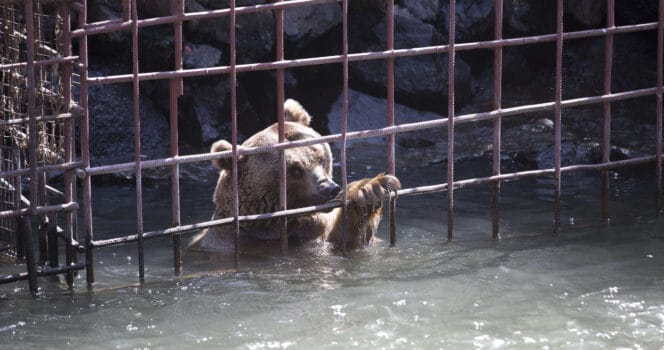There’s something profoundly noble about bears — their quiet strength, their wild beauty. To me, these magnificent animals belong exactly where nature intended: in the wilderness, not behind bars.
And once you hear what Misha and Dasha went through, you’ll understand why I feel so strongly.
For an agonizing ten years, these two brown bears lived a life that can only be described as torment. Confined to a rusting metal cage beside a roadside restaurant in Armenia, they became nothing more than living decorations meant to lure tourists.
Day after day, they endured the same brutal routine. No space to run, no forest to explore — just bars and boredom. With nothing to stimulate their minds, they would endlessly pace the small enclosure, climb in desperation, or slam their heads against the metal walls in frustration and pain. And as if their suffering wasn’t enough, the location of their prison posed yet another threat. The cage sat on the edge of a river, and every time the water rose with the seasons, their lives hung in the balance.
One particularly harrowing year, floodwaters surged so high they nearly drowned. Trapped with no way out, the bears were helpless as the river crept into their enclosure.
“The bears were almost swept away during a flood,” recalled Lis Key, PR and communications manager at International Animal Rescue (IAR). “The rescue team had to physically cut through the cage bars to save them. It’s terrifying to think how close they came to drowning.”
Year after year, IAR, alongside the Foundation for the Preservation of Wildlife and Cultural Assets (FPWC), fought to get Misha and Dasha out of that cage. It wasn’t easy. Convincing the restaurant to let them go took determination, compassion, and patience.
Finally, that day came. A rescue team arrived, armed with tools and purpose. They tore through the cold steel that had confined Misha and Dasha for a decade — setting them free.
The bears were gently sedated and taken to a wildlife sanctuary in the mountains. For the first time in their lives, they could feel soft soil beneath their paws. They could explore, breathe clean air, and simply be what they were always meant to be — wild animals, not spectacles.
Then something incredible happened. As winter settled over the mountains, the bears found a cozy cave and slipped into hibernation. But when spring returned, they didn’t come out alone.
Dasha had given birth.
No one had known she was pregnant. She had been so underweight when rescued, her pregnancy went unnoticed. “We gave her plenty of food to help her recover — fruits, vegetables, honey, nuts — everything she needed to gain weight for hibernation,” said Vicky Mkrtchyan, environmental projects coordinator at FPWC. “But we didn’t realize she was eating for more than one.”
Out of unimaginable suffering, new life had blossomed.
Dasha, once a prisoner of cruelty, had become a mother. In the safety of her new home, she now fiercely nurtures her cubs — protecting them the way she was never protected herself.
“To see her in that tiny, barren cage was heartbreaking,” Mkrtchyan continued. “And now, watching her in the wild with her babies — it’s absolutely beautiful. She’s thriving. It’s like watching a flower bloom after years in the dark.”
What happened to Misha and Dasha is more than a rescue story. It’s a powerful reminder of how resilient animals can be when given the chance. And it’s a testament to the people who refuse to turn away from suffering — who believe that every creature deserves a life of dignity and freedom.
Today, Dasha and her cubs are safe. Misha is finally at peace. And the cage that once held them is empty, rusting quietly as a reminder of what was — and what will never be again.
